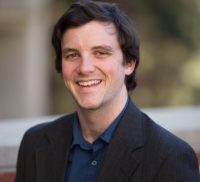Computational Sensing in Biophotonics and Diagnostics

Speaker: Zachary S. Ballard
Affiliation: Ph.D. Candidate
Abstract: Over the past decades, the dramatic increase in computational resources coupled with the advent of machine learning and artificial intelligence has profoundly impacted sensor technology. Together, these trends present a new opportunity for data-driven computational sensor design, where acquisition hardware is fundamentally changed to “lock-in” to the optimal sensing data with respect to a user-defined cost function. This talk will address this emerging opportunity, referred to as computational sensing, with a focus on applications in biophotonics and point-of-care diagnostics where there is currently high-demand for cost-effective and compact sensing systems for democratizing global health.
Several examples of computational sensing systems will be presented. Firstly, I will introduce a multiplexed paper-based vertical flow assay for diagnostics at the point-of-care (POC). I will show how deep learning and statistical analysis of the multiplexed sensor response can be leveraged to improve accuracy, dynamic range, and limit-of-detection, greatly enhancing the sensing capabilities beyond that of the traditionally employed lateral flow assay. Additionally, I will discuss how feature selection techniques can serve as a toolbox for iterative assay development, sensor design, and cost-performance optimization. The results from two clinical studies using this computational sensing approach to POC diagnostics will be presented: one for early-stage Lyme Disease diagnoses, and the other for cardio-vascular risk assessment via the high-sensitivity C-Reactive Protein test.
Secondly, Localized surface plasmon resonance (LSPR) sensors and their corresponding readers will be discussed as computational sensing systems for label-free biomolecular sensing. I will present how LSPR sensor readers can undergo data-driven design to optimize read-out accuracy while minimizing cost by computationally selecting the illumination optics for a given LSPR sensor design. Lastly, a fundamentally different hardware design for spectroscopy, enabled by deep learning, will be demonstrated and discussed for application-specific performance advantages in terms of acquisition rate, form factor, and cost.
Biography: Zachary S. Ballard is currently an NSF fellow and PhD candidate in the Electrical and Computer Engineering Department at University of California, Los Angeles. He received his B.S. degree in Engineering Physics from Brown University in 2013. After graduating, he was a visiting researcher at the Max Planck Institute for the Science of Light in Erlangen, Germany where he worked with free-space coupled micro-resonators for bio-sensing applications. He has authored/co-authored 13 publications in peer-reviewed journals and international conferences as well as a one-book chapter. During his education at UCLA, Zach received the 2015 Dr. Ursula Mandel Scholarship for graduate students in scientific fields allied to medicine, the 2018 SPIE Optics and Photonics Education Scholarship, and the Audience Choice Award at the 2018 UCLA Grad Slam.
For more information, contact Prof. Aydogan Ozcan (ozcan@ucla.edu)
Date/Time:
Date(s) - Oct 22, 2019
11:00 am - 12:30 pm
Location:
E-IV Tesla Room #53-125
420 Westwood Plaza - 5th Flr., Los Angeles CA 90095
